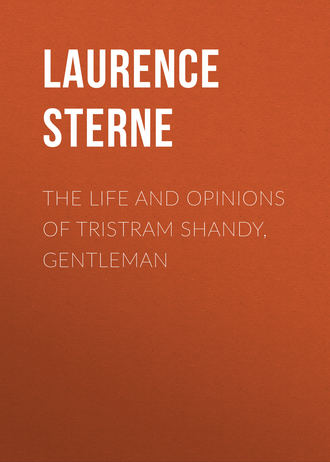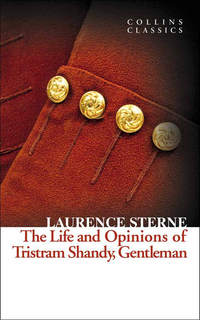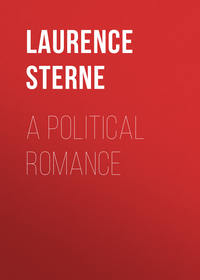
The Life and Opinions of Tristram Shandy, Gentleman
Chapter 3.LXXX
—'Twill come out of itself by and bye.—All I contend for is, that I am not obliged to set out with a definition of what love is; and so long as I can go on with my story intelligibly, with the help of the word itself, without any other idea to it, than what I have in common with the rest of the world, why should I differ from it a moment before the time?—When I can get on no further,—and find myself entangled on all sides of this mystic labyrinth,—my Opinion will then come in, in course,—and lead me out.
At present, I hope I shall be sufficiently understood, in telling the reader, my uncle Toby fell in love:
–Not that the phrase is at all to my liking: for to say a man is fallen in love,—or that he is deeply in love,—or up to the ears in love,—and sometimes even over head and ears in it,—carries an idiomatical kind of implication, that love is a thing below a man:—this is recurring again to Plato's opinion, which, with all his divinityship,—I hold to be damnable and heretical:—and so much for that.
Let love therefore be what it will,—my uncle Toby fell into it.
–And possibly, gentle reader, with such a temptation—so wouldst thou: For never did thy eyes behold, or thy concupiscence covet any thing in this world, more concupiscible than widow Wadman.
Chapter 3.LXXXI
To conceive this right,—call for pen and ink—here's paper ready to your hand.—Sit down, Sir, paint her to your own mind—as like your mistress as you can—as unlike your wife as your conscience will let you—'tis all one to me—please but your own fancy in it.
(blank page)
–Was ever any thing in Nature so sweet!—so exquisite!
–Then, dear Sir, how could my uncle Toby resist it?
Thrice happy book! thou wilt have one page, at least, within thy covers, which Malice will not blacken, and which Ignorance cannot misrepresent.
Chapter 3.LXXXII
As Susannah was informed by an express from Mrs. Bridget, of my uncle Toby's falling in love with her mistress fifteen days before it happened,—the contents of which express, Susannah communicated to my mother the next day,—it has just given me an opportunity of entering upon my uncle Toby's amours a fortnight before their existence.
I have an article of news to tell you, Mr. Shandy, quoth my mother, which will surprise you greatly.—
Now my father was then holding one of his second beds of justice, and was musing within himself about the hardships of matrimony, as my mother broke silence.—
'—My brother Toby,' quoth she, 'is going to be married to Mrs. Wadman.'
–Then he will never, quoth my father, be able to lie diagonally in his bed again as long as he lives.
It was a consuming vexation to my father, that my mother never asked the meaning of a thing she did not understand.
–That she is not a woman of science, my father would say—is her misfortune—but she might ask a question.—
My mother never did.—In short, she went out of the world at last without knowing whether it turned round, or stood still.—My father had officiously told her above a thousand times which way it was,—but she always forgot.
For these reasons, a discourse seldom went on much further betwixt them, than a proposition,—a reply, and a rejoinder; at the end of which, it generally took breath for a few minutes (as in the affair of the breeches), and then went on again.
If he marries, 'twill be the worse for us,—quoth my mother.
Not a cherry-stone, said my father,—he may as well batter away his means upon that, as any thing else,
–To be sure, said my mother: so here ended the proposition—the reply,—and the rejoinder, I told you of.
It will be some amusement to him, too,—said my father.
A very great one, answered my mother, if he should have children.—
–Lord have mercy upon me,—said my father to himself—....
Chapter 3.LXXXIII
I am now beginning to get fairly into my work; and by the help of a vegetable diet, with a few of the cold seeds, I make no doubt but I shall be able to go on with my uncle Toby's story, and my own, in a tolerable straight line. Now,
(four very squiggly lines across the page signed Inv.T.S and Scw.T.S)
These were the four lines I moved in through my first, second, third, and fourth volumes (Alluding to the first edition.)—In the fifth volume I have been very good,—the precise line I have described in it being this:
(one very squiggly line across the page with loops marked A,B,C,C,C,C,C,D)
By which it appears, that except at the curve, marked A. where I took a trip to Navarre,—and the indented curve B. which is the short airing when I was there with the Lady Baussiere and her page,—I have not taken the least frisk of a digression, till John de la Casse's devils led me the round you see marked D.—for as for C C C C C they are nothing but parentheses, and the common ins and outs incident to the lives of the greatest ministers of state; and when compared with what men have done,—or with my own transgressions at the letters ABD—they vanish into nothing.
In this last volume I have done better still—for from the end of Le Fever's episode, to the beginning of my uncle Toby's campaigns,—I have scarce stepped a yard out of my way.
If I mend at this rate, it is not impossible—by the good leave of his grace of Benevento's devils—but I may arrive hereafter at the excellency of going on even thus:
(straight line across the page)
which is a line drawn as straight as I could draw it, by a writing-master's ruler (borrowed for that purpose), turning neither to the right hand or to the left.
This right line,—the path-way for Christians to walk in! say divines—
–The emblem of moral rectitude! says Cicero—
–The best line! say cabbage planters—is the shortest line, says Archimedes, which can be drawn from one given point to another.—
I wish your ladyships would lay this matter to heart, in your next birth-day suits!
–What a journey!
Pray can you tell me,—that is, without anger, before I write my chapter upon straight lines—by what mistake—who told them so—or how it has come to pass, that your men of wit and genius have all along confounded this line, with the line of Gravitation?
Chapter 3.LXXXIV
No—I think, I said, I would write two volumes every year, provided the vile cough which then tormented me, and which to this hour I dread worse than the devil, would but give me leave—and in another place—(but where, I can't recollect now) speaking of my book as a machine, and laying my pen and ruler down cross-wise upon the table, in order to gain the greater credit to it—I swore it should be kept a going at that rate these forty years, if it pleased but the fountain of life to bless me so long with health and good spirits.
Now as for my spirits, little have I to lay to their charge—nay so very little (unless the mounting me upon a long stick and playing the fool with me nineteen hours out of the twenty-four, be accusations) that on the contrary, I have much—much to thank 'em for: cheerily have ye made me tread the path of life with all the burthens of it (except its cares) upon my back; in no one moment of my existence, that I remember, have ye once deserted me, or tinged the objects which came in my way, either with sable, or with a sickly green; in dangers ye gilded my horizon with hope, and when Death himself knocked at my door—ye bad him come again; and in so gay a tone of careless indifference, did ye do it, that he doubted of his commission—
'—There must certainly be some mistake in this matter,' quoth he.
Now there is nothing in this world I abominate worse, than to be interrupted in a story—and I was that moment telling Eugenius a most tawdry one in my way, of a nun who fancied herself a shell-fish, and of a monk damn'd for eating a muscle, and was shewing him the grounds and justice of the procedure—
'—Did ever so grave a personage get into so vile a scrape?' quoth Death. Thou hast had a narrow escape, Tristram, said Eugenius, taking hold of my hand as I finished my story—
But there is no living, Eugenius, replied I, at this rate; for as this son of a whore has found out my lodgings—
–You call him rightly, said Eugenius,—for by sin, we are told, he enter'd the world—I care not which way he enter'd, quoth I, provided he be not in such a hurry to take me out with him—for I have forty volumes to write, and forty thousand things to say and do which no body in the world will say and do for me, except thyself; and as thou seest he has got me by the throat (for Eugenius could scarce hear me speak across the table), and that I am no match for him in the open field, had I not better, whilst these few scatter'd spirits remain, and these two spider legs of mine (holding one of them up to him) are able to support me—had I not better, Eugenius, fly for my life? 'Tis my advice, my dear Tristram, said Eugenius—Then by heaven! I will lead him a dance he little thinks of—for I will gallop, quoth I, without looking once behind me, to the banks of the Garonne; and if I hear him clattering at my heels—I'll scamper away to mount Vesuvius—from thence to Joppa, and from Joppa to the world's end; where, if he follows me, I pray God he may break his neck—
–He runs more risk there, said Eugenius, than thou.
Eugenius's wit and affection brought blood into the cheek from whence it had been some months banish'd—'twas a vile moment to bid adieu in; he led me to my chaise—Allons! said I; the post-boy gave a crack with his whip—off I went like a cannon, and in half a dozen bounds got into Dover.
Chapter 3.LXXXV
Now hang it! quoth I, as I look'd towards the French coast—a man should know something of his own country too, before he goes abroad—and I never gave a peep into Rochester church, or took notice of the dock of Chatham, or visited St. Thomas at Canterbury, though they all three laid in my way—
–But mine, indeed, is a particular case—
So without arguing the matter further with Thomas o'Becket, or any one else—I skip'd into the boat, and in five minutes we got under sail, and scudded away like the wind.
Pray, captain, quoth I, as I was going down into the cabin, is a man never overtaken by Death in this passage?
Why, there is not time for a man to be sick in it, replied he—What a cursed lyar! for I am sick as a horse, quoth I, already—what a brain!—upside down!—hey-day! the cells are broke loose one into another, and the blood, and the lymph, and the nervous juices, with the fix'd and volatile salts, are all jumbled into one mass—good G..! every thing turns round in it like a thousand whirlpools—I'd give a shilling to know if I shan't write the clearer for it—
Sick! sick! sick! sick—!
–When shall we get to land? captain—they have hearts like stones—O I am deadly sick!—reach me that thing, boy—'tis the most discomfiting sickness—I wish I was at the bottom—Madam! how is it with you? Undone! undone! un…—O! undone! sir—What the first time?—No, 'tis the second, third, sixth, tenth time, sir,—hey-day!—what a trampling over head!—hollo! cabin boy! what's the matter?
The wind chopp'd about! s'Death—then I shall meet him full in the face.
What luck!—'tis chopp'd about again, master—O the devil chop it—
Captain, quoth she, for heaven's sake, let us get ashore.
Chapter 3.LXXXVI
It is a great inconvenience to a man in a haste, that there are three distinct roads between Calais and Paris, in behalf of which there is so much to be said by the several deputies from the towns which lie along them, that half a day is easily lost in settling which you'll take.
First, the road by Lisle and Arras, which is the most about—but most interesting, and instructing.
The second, that by Amiens, which you may go, if you would see Chantilly—
And that by Beauvais, which you may go, if you will.
For this reason a great many chuse to go by Beauvais.
Chapter 3.LXXXVII
'Now before I quit Calais,' a travel-writer would say, 'it would not be amiss to give some account of it.'—Now I think it very much amiss—that a man cannot go quietly through a town and let it alone, when it does not meddle with him, but that he must be turning about and drawing his pen at every kennel he crosses over, merely o' my conscience for the sake of drawing it; because, if we may judge from what has been wrote of these things, by all who have wrote and gallop'd—or who have gallop'd and wrote, which is a different way still; or who, for more expedition than the rest, have wrote galloping, which is the way I do at present—from the great Addison, who did it with his satchel of school books hanging at his a…, and galling his beast's crupper at every stroke—there is not a gallopper of us all who might not have gone on ambling quietly in his own ground (in case he had any), and have wrote all he had to write, dry-shod, as well as not.
For my own part, as heaven is my judge, and to which I shall ever make my last appeal—I know no more of Calais (except the little my barber told me of it as he was whetting his razor) than I do this moment of Grand Cairo; for it was dusky in the evening when I landed, and dark as pitch in the morning when I set out, and yet by merely knowing what is what, and by drawing this from that in one part of the town, and by spelling and putting this and that together in another—I would lay any travelling odds, that I this moment write a chapter upon Calais as long as my arm; and with so distinct and satisfactory a detail of every item, which is worth a stranger's curiosity in the town—that you would take me for the town-clerk of Calais itself—and where, sir, would be the wonder? was not Democritus, who laughed ten times more than I—town-clerk of Abdera? and was not (I forget his name) who had more discretion than us both, town-clerk of Ephesus?—it should be penn'd moreover, sir, with so much knowledge and good sense, and truth, and precision—
–Nay—if you don't believe me, you may read the chapter for your pains.
Chapter 3.LXXXVIII
Calais, Calatium, Calusium, CalesiumThis town, if we may trust its archives, the authority of which I see no reason to call in question in this place—was once no more than a small village belonging to one of the first Counts de Guignes; and as it boasts at present of no less than fourteen thousand inhabitants, exclusive of four hundred and twenty distinct families in the basse ville, or suburbs—it must have grown up by little and little, I suppose, to its present size.
Though there are four convents, there is but one parochial church in the whole town; I had not an opportunity of taking its exact dimensions, but it is pretty easy to make a tolerable conjecture of 'em—for as there are fourteen thousand inhabitants in the town, if the church holds them all it must be considerably large—and if it will not—'tis a very great pity they have not another—it is built in form of a cross, and dedicated to the Virgin Mary; the steeple, which has a spire to it, is placed in the middle of the church, and stands upon four pillars elegant and light enough, but sufficiently strong at the same time—it is decorated with eleven altars, most of which are rather fine than beautiful. The great altar is a master-piece in its kind; 'tis of white marble, and, as I was told, near sixty feet high—had it been much higher, it had been as high as mount Calvary itself—therefore, I suppose it must be high enough in all conscience.
There was nothing struck me more than the great Square; tho' I cannot say 'tis either well paved or well built; but 'tis in the heart of the town, and most of the streets, especially those in that quarter, all terminate in it; could there have been a fountain in all Calais, which it seems there cannot, as such an object would have been a great ornament, it is not to be doubted, but that the inhabitants would have had it in the very centre of this square,—not that it is properly a square,—because 'tis forty feet longer from east to west, than from north to south; so that the French in general have more reason on their side in calling them Places than Squares, which, strictly speaking, to be sure, they are not.
The town-house seems to be but a sorry building, and not to be kept in the best repair; otherwise it had been a second great ornament to this place; it answers however its destination, and serves very well for the reception of the magistrates, who assemble in it from time to time; so that 'tis presumable, justice is regularly distributed.
I have heard much of it, but there is nothing at all curious in the Courgain; 'tis a distinct quarter of the town, inhabited solely by sailors and fishermen; it consists of a number of small streets, neatly built and mostly of brick; 'tis extremely populous, but as that may be accounted for, from the principles of their diet,—there is nothing curious in that neither.—A traveller may see it to satisfy himself—he must not omit however taking notice of La Tour de Guet, upon any account; 'tis so called from its particular destination, because in war it serves to discover and give notice of the enemies which approach the place, either by sea or land;—but 'tis monstrous high, and catches the eye so continually, you cannot avoid taking notice of it if you would.
It was a singular disappointment to me, that I could not have permission to take an exact survey of the fortifications, which are the strongest in the world, and which, from first to last, that is, for the time they were set about by Philip of France, Count of Bologne, to the present war, wherein many reparations were made, have cost (as I learned afterwards from an engineer in Gascony)—above a hundred millions of livres. It is very remarkable, that at the Tete de Gravelenes, and where the town is naturally the weakest, they have expended the most money; so that the outworks stretch a great way into the campaign, and consequently occupy a large tract of ground—However, after all that is said and done, it must be acknowledged that Calais was never upon any account so considerable from itself, as from its situation, and that easy entrance which it gave our ancestors, upon all occasions, into France: it was not without its inconveniences also; being no less troublesome to the English in those times, than Dunkirk has been to us, in ours; so that it was deservedly looked upon as the key to both kingdoms, which no doubt is the reason that there have arisen so many contentions who should keep it: of these, the siege of Calais, or rather the blockade (for it was shut up both by land and sea), was the most memorable, as it with-stood the efforts of Edward the Third a whole year, and was not terminated at last but by famine and extreme misery; the gallantry of Eustace de St. Pierre, who first offered himself a victim for his fellow-citizens, has rank'd his name with heroes. As it will not take up above fifty pages, it would be injustice to the reader, not to give him a minute account of that romantic transaction, as well as of the siege itself, in Rapin's own words:
Chapter 3.LXXXIX
—But courage! gentle reader!—I scorn it—'tis enough to have thee in my power—but to make use of the advantage which the fortune of the pen has now gained over thee, would be too much—No—! by that all-powerful fire which warms the visionary brain, and lights the spirits through unworldly tracts! ere I would force a helpless creature upon this hard service, and make thee pay, poor soul! for fifty pages, which I have no right to sell thee,—naked as I am, I would browse upon the mountains, and smile that the north wind brought me neither my tent or my supper.
–So put on, my brave boy! and make the best of thy way to Boulogne.
Chapter 3.XC
Boulogne!—hah!—so we are all got together—debtors and sinners before heaven; a jolly set of us—but I can't stay and quaff it off with you—I'm pursued myself like a hundred devils, and shall be overtaken, before I can well change horses:—for heaven's sake, make haste—'Tis for high-treason, quoth a very little man, whispering as low as he could to a very tall man, that stood next him—Or else for murder; quoth the tall man—Well thrown, Size-ace! quoth I. No; quoth a third, the gentleman has been committing—
Ah! ma chere fille! said I, as she tripp'd by from her matins—you look as rosy as the morning (for the sun was rising, and it made the compliment the more gracious)—No; it can't be that, quoth a fourth—(she made a curt'sy to me—I kiss'd my hand) 'tis debt, continued he: 'Tis certainly for debt; quoth a fifth; I would not pay that gentleman's debts, quoth Ace, for a thousand pounds; nor would I, quoth Size, for six times the sum—Well thrown, Size-ace, again! quoth I;—but I have no debt but the debt of Nature, and I want but patience of her, and I will pay her every farthing I owe her—How can you be so hard-hearted, Madam, to arrest a poor traveller going along without molestation to any one upon his lawful occasions? do stop that death-looking, long-striding scoundrel of a scare-sinner, who is posting after me—he never would have followed me but for you—if it be but for a stage or two, just to give me start of him, I beseech you, madam—do, dear lady—
–Now, in troth, 'tis a great pity, quoth mine Irish host, that all this good courtship should be lost; for the young gentlewoman has been after going out of hearing of it all along.—
–Simpleton! quoth I.
–So you have nothing else in Boulogne worth seeing?
–By Jasus! there is the finest Seminary for the Humanities—
–There cannot be a finer; quoth I.
Chapter 3.XCI
When the precipitancy of a man's wishes hurries on his ideas ninety times faster than the vehicle he rides in—woe be to truth! and woe be to the vehicle and its tackling (let 'em be made of what stuff you will) upon which he breathes forth the disappointment of his soul!
As I never give general characters either of men or things in choler, 'the most haste the worse speed,' was all the reflection I made upon the affair, the first time it happen'd;—the second, third, fourth, and fifth time, I confined it respectively to those times, and accordingly blamed only the second, third, fourth, and fifth post-boy for it, without carrying my reflections further; but the event continuing to befal me from the fifth, to the sixth, seventh, eighth, ninth, and tenth time, and without one exception, I then could not avoid making a national reflection of it, which I do in these words;
That something is always wrong in a French post-chaise, upon first setting out.
Or the proposition may stand thus:
A French postilion has always to alight before he has got three hundred yards out of town.
What's wrong now?—Diable!—a rope's broke!—a knot has slipt!—a staple's drawn!—a bolt's to whittle!—a tag, a rag, a jag, a strap, a buckle, or a buckle's tongue, want altering.
Now true as all this is, I never think myself impowered to excommunicate thereupon either the post-chaise, or its driver—nor do I take it into my head to swear by the living G.., I would rather go a-foot ten thousand times—or that I will be damn'd, if ever I get into another—but I take the matter coolly before me, and consider, that some tag, or rag, or jag, or bolt, or buckle, or buckle's tongue, will ever be a wanting or want altering, travel where I will—so I never chaff, but take the good and the bad as they fall in my road, and get on:—Do so, my lad! said I; he had lost five minutes already, in alighting in order to get at a luncheon of black bread, which he had cramm'd into the chaise-pocket, and was remounted, and going leisurely on, to relish it the better.—Get on, my lad, said I, briskly—but in the most persuasive tone imaginable, for I jingled a four-and-twenty sous piece against the glass, taking care to hold the flat side towards him, as he look'd back: the dog grinn'd intelligence from his right ear to his left, and behind his sooty muzzle discovered such a pearly row of teeth, that Sovereignty would have pawn'd her jewels for them.
Just heaven! What masticators!—/What bread—!
and so as he finished the last mouthful of it, we entered the town of Montreuil.
Chapter 3.XCII
There is not a town in all France which, in my opinion, looks better in the map, than Montreuil;—I own, it does not look so well in the book of post-roads; but when you come to see it—to be sure it looks most pitifully.
There is one thing, however, in it at present very handsome; and that is, the inn-keeper's daughter: She has been eighteen months at Amiens, and six at Paris, in going through her classes; so knits, and sews, and dances, and does the little coquetries very well.—






